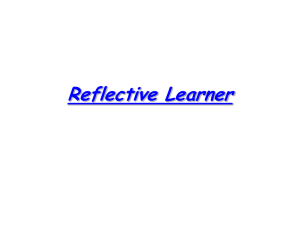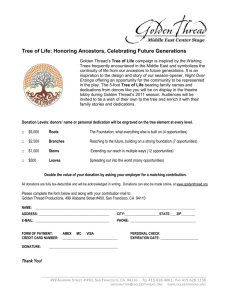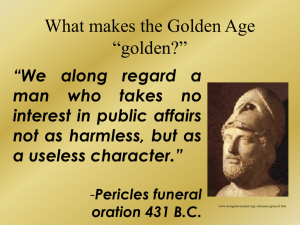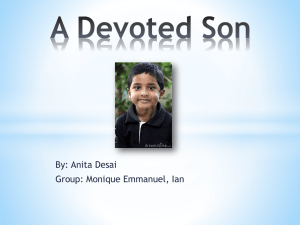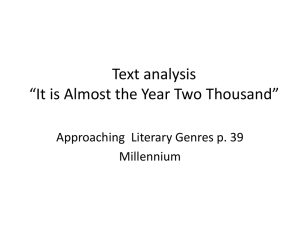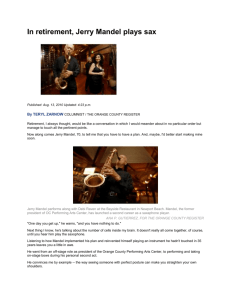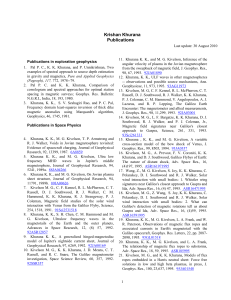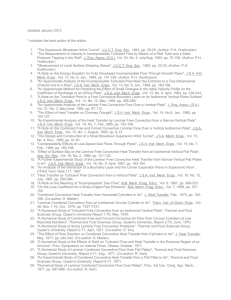Martineau_dmin717_VEsynthesis
advertisement
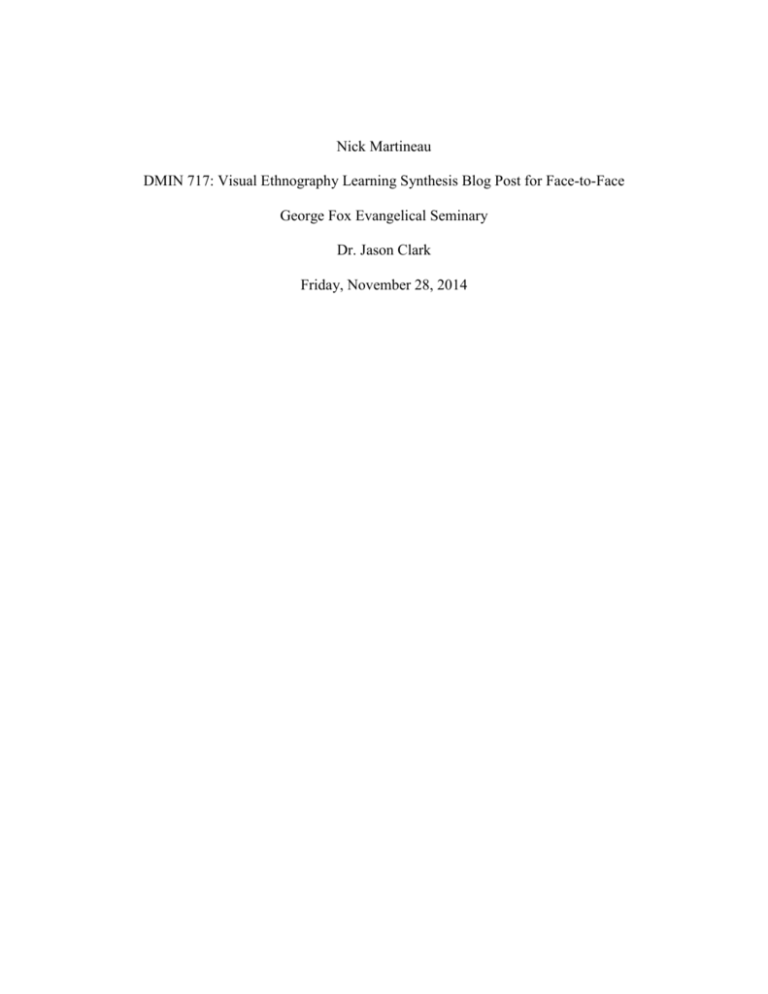
Nick Martineau DMIN 717: Visual Ethnography Learning Synthesis Blog Post for Face-to-Face George Fox Evangelical Seminary Dr. Jason Clark Friday, November 28, 2014 Visual Ethnography Assignment Students Personal Interests Many things stood out at my first face-to-face Advance to Cape Town, South Africa. Going into the trip I was excited to meet my cohort, other cohorts, advisors, and professors. The Global perspective part of this course has been intriguing to me and I was really curious to see how it would play out. In the final chapter of David F. Ford’s book, Theology: A Very Short Introduction he asks the question, “How can dialogical and comparative theology flourish?1” Ford goes onto explain “Mutual hospitality, conversation, facing differences, rigorous argument, friendship with integrity: if those are not possible between people who pursue theological wisdom in different disciplines, faith communities, and nations, then what hope is there for the world?2 During the Advance I was really thankful to see this play out. It was exciting to enter into a group of theological thinkers that ask good questions, stimulate thought, and respect one another. As this program goes on I am looking forward to being surrounded by Global perspectives and with mutual hospitality facing our differences in search of the truth. We are helping dialogical and comparative theology flourish. As I learn from this Leadership and Global perspective program I am looking for ways for this to plan out in Wichita as well. During our time in South Africa I was also struck by how much racial tension still exists in their daily lives. My wife and I adopted two boys from Uganda so I am always drawn into conversations about racial reconciliation and honest talks about where we find ourselves and how the communities around us view race. Reading Road 2 Bridges3 and meeting with authors Leon Oosthuizen and Xola Skosana was a powerful part of the trip for me. Oosthuizen and Skosana engaged these issues unlike many have. They showed 1 David F. Ford, Theology: a Very Short Introduction (New York: Oxford University Press, 2000), 2 Ibid., 174 Leon Oosthuizen, Xola Skosana, Road Roads 2 Bridges (South Africa: Emmaus Media, 2013). 174. 3 love and respect for each other while not dodging the issues and current climate of South Africa’s culture. You could sense the tension they are still walking through but they genuinely appeared committed to working it out and their relationship. It is easy to avoid difficult topics but Oosthuizen and Skosana provide a clear example of how leaders can lead their churches through uncomfortable, challenging issues. Since returning I have also thought often of Golden. Golden’s son walking us through his neighborhood, meeting Golden’s family, and watching Golden turn someone’s trash into beautiful flowers, was an amazing picture of our heavenly Father’s love and grace. I was taken back watching the love Golden and his family had for each other. His girls seemed to love the attention, posing for the cameras, and appeared to have true joy. Golden’s son took pride in his tour guide role and when asked he looked forward to one day making flowers just like his dad. And Golden seemed empowered. The Father gave him a vision and Golden’s hard work has resulted in blessing and provision for his family. Golden’s story has reminded me to listen to God and believe the unbelievable. I use to be someone that dreamed big dreams in my sleep. I use to pay close attention to my dreams and journal them when I woke up. As I’ve grown older and life has gotten busier I’ve stopped paying attention to me dreams. Golden has reminded me that our God still speaks to us in our sleep and I want to pay closer attention to what He is saying. New Knowledge I had an understanding of Apartheid before going to South Africa but there is no book that can prepare you for walking through District Six or hearing testimonies of forced removal. Restitution isn’t a new concept for me but being in South Africa gave it new meaning. Listening to Mary Burton share her desire for more to be done on the area of restitution stuck with me. When we wrong someone we should try our best to make it right but is restitution actually possible? Healing in South Africa hasn’t taken place because the wounds are still fresh and while forgiveness has been offered, restitution hasn’t taken place for most people. I kept thinking that true restitution is impossible without Jesus. When we commit a hurt on another we can never fully return what was lost or stolen in this life. That’s why our only hope is in Jesus. How does South Africa really heal from the evil of Apartheid with Jesus? Not just Apartheid but even in my life. How does one heal from the evil we’ve all experienced without Jesus? Can true restitution even exist? These are questions I’m still pondering. Another new concept I’ve been thinking about since our time in Cape Town has been Caroline Ramsey’s presentation and my conversations with her about leadership versus leader. She helped me articulate thoughts I’d never been able to articulate before. I’m intrigued by the idea that appointed leaders often create a hindrance to actual leadership taking place. I’ve seen this play out time and time again in organizations I’ve been a part of. We all have potential for leadership and when an organization places all leadership into one leader we lose out on the gifts of many, and we are limited by the gifts of that one leader. Nitin Nohria and Rakesh Khurana in their book Handbook of Leadership Theory and Practice4 go into great depths on not just developing leaders but taking an indepth look at leadership. The idea that leadership should be expected and looked for in an organization from top to bottom is a lost art in the United States. Caroline spoke with me about how different the European academic management principles are from the management principles being taught in the United States. I left the Advance with a desire 4 Nitin Nohria, Rakesh Khurana. Handbook of Leadership Theory and Practice (Boston, Mass.: Harvard Business Press, 2010). to learn more about facilitating participatory conversations and learning more of narrative leadership. Practice: I came home with a handful of things from the Advance I wanted to put into practice. Not all have been successful but at least I have tried. Chris Ahrends characteristics of a leader motivated me. Particularly, his explanation of the need for a leader to have silence really convicted me. Chris said, “Americans have lost the art of being, we are too busy doing. We have lost the art of facing ourselves. The matrix of values are found in the depths of silence...5” Adding this doctorate program to my plate has squeezed my time and it’s easy to just throw out silence and time to listen. I’ve been trying to take time in the morning and after lunch to just be still, even if it’s only for 3 minutes. I’ve failed more times then I’ve succeeded but it is an area I see great value in and I’m committed to continue growing in. Chris Ahrends, “Leadership Thoughts Insights for Servant Leadership/ Facilitation Leaders” (lecture, Cape Town, South Africa, Octo+6ber 1, 2014). 5 I’ve also been sharing Leon Oosthuizen and Xola Skosana Road 2 Bridges6 book with other leaders. I serve as the chairman of the board to World Impact, an urban church planting ministry here in Wichita, Kansas. My role connects board members to World Impacts vision and the missionaries that carry it out. As a white suburbanite I often feel inadequate when teaching/leading in the urban city. I’ve been using Roads 2 Bridges as a conversation starter. I have found that since it reflects South African culture we are able to read through it with in a non-threatening way. It has been helpful for urban leaders to read the book and share with me what cultural struggles they can relate to and what issues they don’t see existing. The conversation has been welcomed but few people know where to take the conversation next. I foresee continuing to use Road 2 Bridges as I attempt to build relationships in the urban city and understand their daily life. Since returning from Cape Town I have also moved into my new role at my church. I am now in charge of managing and developing our 11 staff members. For some this is a welcomed transition and for others they are still trying to get comfortable with me as their new boss. I have a Business undergraduate degree but it has been years since I studied leadership theory. It has been good for me to hear leadership principles at the Advance and to read Nitin Nohria and Rakesh Khurana book Handbook of Leadership Theory and Practice.7 I’m inheriting a staff situation that has lacked accountability, vision, and structure so my initial desire was to quickly go in and clean things up. After coming away from the Advance I have been reminded of the need to move slowly and I am motivated to facilitate staff conversations to hear what ideas they have for improving our staff atmosphere. I know Caroline Ramsey would be proud! In Chapter 25 of Nohri and Khurana’s book Bruce Avolio goes in depth on a leadership paradigm change he went through. He use to have a reverse telescope approach that closely studied in on a leader but has flipped the telescope around to get a good look at the larger global context to see exactly where good leadership practices take place.8 This has really helped me change my approach to my first couple months in my new position. I’ve taken a step back and looked at our organizational structure and the spirit we’ve created instead of directly focusing in on individuals. I don’t know many people that enjoy being micro managed and it’s not the best way to empower individuals. 6 Leon Oosthuizen, Xola Skosana, Road Roads 2 Bridges (South Africa: Emmaus Media, 2013). Nitin Nohria, Rakesh Khurana. Handbook of Leadership Theory and Practice (Boston, Mass.: Harvard Business Press, 2010). 8 Nitin Nohria, Rakesh Khurana. Handbook of Leadership Theory and Practice (Boston, Mass.: Harvard Business Press, 2010), 739. 7 Application Nelson Mandel had a vision for equality and led a nation. I was amazed that his resolve and humbleness could be felt throughout the entire country. Nelson Mandel’s example has stuck with me and has played a part in how I view my leadership role. I want to be a leader that serves with humility. I desire to never be shaken from my vision to unite people around the truth of Jesus. I know that won’t happen with just eloquent words. Mandel’s example of service, sacrifice, and determination will serve as a constant reminder to me. I’m still pondering our tour of Robben Island. Suffering and sacrifice in my life play out in short seasons but for Mandel it was years and years. I’m still processing the significance of that tour but it’s very present in how I’m thinking about my role in the Kingdom. Meeting my cohort and the other cohorts gave me a picture of what these next few years will look like. An expanding of my perspective took place during the Advance. I’ve always been a guy that “gets things done” but I haven’t always put thought into why I do the things I do. I’m very aware that the Father is using this program and these people to make me be more intentional about what I’m doing in my life. This thought has permeated everything I do since returning from the Advance. I know there needs to be a “why” to my actions. This really connected for me when I read Dr. Richard Paul and Dr. Linda Elder’s book Miniature Guide to Critical Thinking Concepts and Tools9. Their writing about the unreflective thinker and the accomplished thinker has really challenged me. I too often take the easy approach and I don’t want to do that anymore. I desire to grow as a thinker and I am sure this program will be a big part in helping make that happen. I spent my time on top of Table Mountain pondering what these next few years and beyond will look like. It’s impossible to truly know but while looking out over Cape Town I had this overwhelming sense that this program will change me. I’m not just 9 Paul, Dr. Richard, and Dr. Linda Elder. Miniature Guide to Critical Thinking Concepts and Tools. 6th ed.: Foundation for Critical Thinking, 1999. looing for a new degree at the end of this but I hope to come out of this program why a greater ability to explain the “why” in my life. Bibliography Ahrends, Chris “Leadership Thoughts Insights for Servant Leadership/Facilitation Leaders” (lecture, Cape Town, South Africa, October 1, 2014). Ford, David. Theology: a Very Short Introduction. 2 ed. New York: Oxford University Press, 2000. Nohria, Nitin and Rakesh Khurana. Handbook of Leadership Theory and Practice. Boston: Harvard Business Press, 2010. Oosthuizen, Leon and Xola Skosana, Roads 2 Bridges. South Africa: Emmaus Media, 2013. Paul, Dr. Richard, and Dr. Linda Elder. Miniature Guide to Critical Thinking Concepts and Tools. 6th ed.: Foundation for Critical Thinking, 1999.
